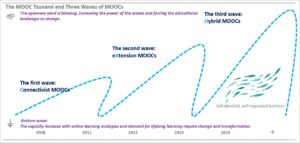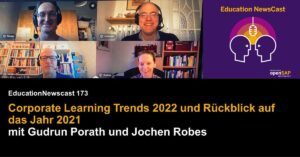Quelle: Weiterbildungsblog Autor: jrobes
Noch etwas MOOC-Research zum Jahresbeginn: Der Autor hat nach Forschungsbeiträgen aus den Jahren 2016 – 2018 gesucht, schließlich 633 Artikel gefunden und nach Schwerpunkten untersucht. Vier wiederkehrende Themen wurden dabei sichtbar: „(I) MOOCs as a mainstreaming learning model in HE, (II) motivation and engagement issues in MOOCs, (III) assessment issues in MOOCs, and (IV) MOOCs for social learning.“
Die Schlussfolgerung: „Overall, the research concludes that the first wave of MOOC research largely concentrated on the qualitative characteristics of the phenomenon, while the second and third waves of MOOC research concentrated on the quantitative characteristics.“

Wenn man die MOOC-Historie betrachtet, sind diese Beobachtungen gut nachvollziehbar. Allerdings bezweifele ich, ob die Keywords „MOOCs“ und „Massive Open Online Courses“ für die Suche nach passenden Artikeln in Zukunft ausreichen. Denn in den letzten fünf Jahren haben sich fast alle großen Kursanbieter vom Begriff „MOOC“ verabschiedet.
Aras Bozkurt, Open Praxis, 2021, 13(3), S. 296 – 311
